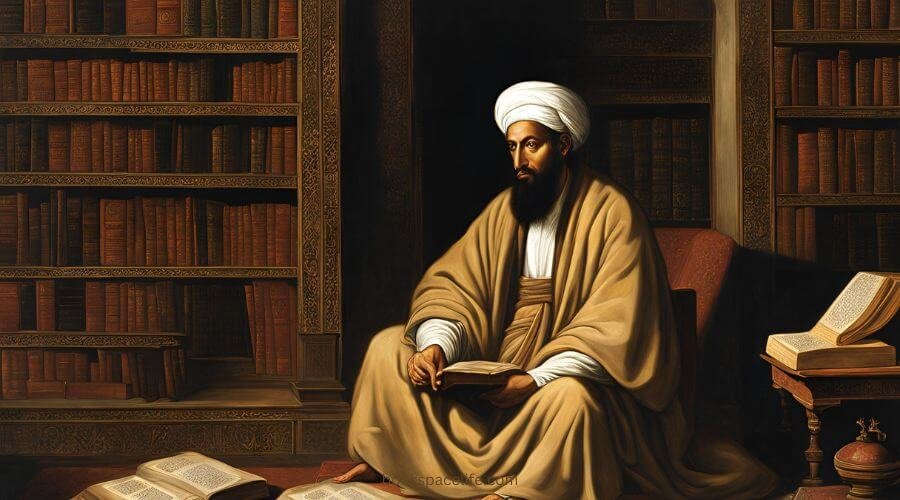Philo of Alexandria
Ibn Taymiyyah : A Revolutionary Thinker in Medieval Islamic Philosophy
Ibn Taymiyyah (1263–1328 CE) was one of the most influential and controversial figures in the history of Islamic thought.
A philosopher, theologian, jurist, and scholar of unparalleled depth, his ideas and writings have continued to shape Islamic discourse and practice for centuries.
Born into a period of political and social upheaval, Ibn Taymiyyah’s intellectual journey is marked by his relentless pursuit of what he perceived as the purest form of Islam, drawing from the Quran and the Hadith.
His contributions to Islamic thought and his interpretations of Islamic law and theology continue to inspire modern movements across the Muslim world.
Table of Contents
(1) Early Life and Education
Ibn Taymiyyah was born in 1263 CE in Harbin, a city in present-day Syria, into a family of scholars with a rich intellectual tradition.
His father, Taqi al-Din Ahmad, was a renowned scholar and a prominent figure in Hanbali jurisprudence.
Ibn Taymiyyah’s early exposure to scholarly life was fundamental to his intellectual development.
His family was part of the scholarly elite of Damascus, which allowed him access to a vast array of knowledge in various fields, including theology, law, philosophy, and natural sciences.
From a young age, Ibn Taymiyyah demonstrated exceptional intellectual abilities.
He studied Islamic jurisprudence (fiqh), hadith (the sayings of the Prophet Muhammad), theology, Arabic linguistics, logic, and philosophy under the guidance of his father and other prominent scholars.
In addition to traditional Islamic sciences, he was introduced to the writings of ancient Greek philosophers, as well as works on Persian and Indian thought, which he later critiqued.
By his teenage years, Ibn Taymiyyah had already become proficient in many scholarly disciplines, and by the age of 20, he had authored several works on theology and jurisprudence.
His deep commitment to intellectual inquiry and his thirst for knowledge set him apart from many of his contemporaries, shaping him into a formidable intellectual figure.
(2) Travels and Intellectual Pursuits
Ibn Taymiyyah’s intellectual journey was not confined to his hometown of Damascus.
He traveled widely across the Islamic world, seeking knowledge and engaging with scholars in various cities.
His travels to Mecca and Medina, the two holiest cities in Islam, allowed him to further deepen his knowledge of the Quran and Hadith, especially the works of earlier scholars from the Hanbali and Shafi’i schools of thought.
In addition to his theological education, Ibn Taymiyyah encountered the intellectual currents of his time, including the works of philosophers and theologians such as Avicenna (Ibn Sina) and Al-Ghazali.
He was particularly influenced by Al-Ghazali’s writings, but he later criticized the mystical Sufism of Al-Ghazali and other figures who, in his view, had departed from the authentic teachings of Islam.
Ibn Taymiyyah was particularly concerned with the philosophical and theological influences of Greek and Persian thought, which he believed had infiltrated Islamic thought and led to deviations from the true faith.
His travels also exposed him to the diverse intellectual landscapes of the Mamluk Sultanate and the wider Islamic world.
The political instability and military conflicts in the region, such as the Mongol invasions, played a significant role in shaping Ibn Taymiyyah’s worldview and philosophy.
He witnessed firsthand the consequences of political fragmentation and the weakening of Islamic authority, which influenced many of his later theological and political ideas.
(3) Philosophical and Theological Ideas
Ibn Taymiyyah’s philosophy was shaped by his deep commitment to scripturalism, emphasizing the Quran and Hadith as the primary sources of Islamic knowledge.
He believed that these sources provided the most reliable guidance for understanding the nature of God, the universe, and human existence.
His ideas were based on the conviction that reason and philosophy should always be subordinate to the divine revelation in the Quran and Hadith.
One of his most significant contributions was his critique of rationalism and philosophical speculation, which had become prevalent in medieval Islamic thought.
In contrast to the Peripatetic philosophers such as Avicenna, who sought to reconcile Greek philosophy with Islamic thought, Ibn Taymiyyah argued that rational philosophy had a corrupting influence on Islamic teachings.
He was particularly critical of the Avicennian approach to metaphysics, which he believed led to speculative doctrines that were not rooted in the Quranic teachings.
Another key area of Ibn Taymiyyah’s thought was his understanding of theology.
He was a staunch defender of traditional Sunni Islam and a fierce critic of innovations and deviations that he saw as contrary to the original teachings of the Prophet Muhammad.
His writings reflect a deep commitment to the Ash’ari theological school, but he critiqued its later developments, especially the influence of philosophy and mysticism (Sufism) on Islamic thought.
Ibn Taymiyyah believed that true Islamic spirituality should be directly connected to the teachings of the Quran and Hadith, without the mediation of mystical practices or speculative theology.
Key Contributions
(i) Theology and Tawhid:
Ibn Taymiyyah’s central theological concept was Tawhid (the oneness of God), which he viewed as the foundation of Islam.
He emphasized that any form of polytheism (shirk) or innovations (bid’ah) in religion was a severe deviation from true Islam.
He argued that the concept of God in Islamic theology must remain free from any anthropomorphisms or speculative philosophies that could distort God’s nature.
(ii) The Rejection of Philosophical Speculation:
Ibn Taymiyyah famously rejected the dominant philosophical schools in medieval Islam, particularly Avicenna’s interpretation of Aristotle, and the mystical elements introduced by Sufism.
He believed that these systems of thought often led to deviations from the fundamental teachings of Islam, and that scholars should focus on returning to the core principles of the Quran and Hadith.
(iii) Jihad and Islamic Politics:
Ibn Taymiyyah’s views on jihad were notably radical and confrontational.
During his lifetime, the Mongols were seen as a significant threat to the Islamic world, and Ibn Taymiyyah advocated for armed struggle against them, deeming it a religious obligation.
He argued that the Mongols, despite their conversion to Islam, had adopted practices that were incompatible with the true principles of Islam.
His call for jihad became a defining feature of his political philosophy, emphasizing the need for an active defense of the Muslim community.
(iv) The Importance of the Hadith:
Ibn Taymiyyah placed great importance on the Hadith (the sayings and actions of the Prophet Muhammad) and used them as a central basis for his legal, theological, and philosophical writings.
He believed that the Hadith provided the clearest guidance for Islamic practice and that scholars should rely on authentic Hadith in their interpretation of Islam.
(4) Influence and Legacy
Ibn Taymiyyah’s influence on Islamic thought cannot be overstated. While his ideas were often controversial in his own time and led to multiple imprisonments, his legacy grew in importance in the centuries following his death.
He became a central figure in the Salafi movement, which emphasizes a return to the practices of the early generations of Muslims (the Salaf), and his thoughts have significantly shaped Islamic reform movements in the 19th and 20th centuries.
His ideas also had a profound impact on later scholars, including Muhammad ibn Abd al-Wahhab, the founder of Wahhabism, a strict and puritanical interpretation of Islam that emerged in Saudi Arabia.
Ibn Taymiyyah’s rejection of philosophical speculation, his strict adherence to the Quran and Hadith, and his focus on the oneness of God became foundational principles for these later movements.
Ibn Taymiyyah’s works on Islamic law, theology, and philosophy continue to be studied by scholars today, and his call for a return to the core principles of Islam resonates with a wide range of Islamic reformers.
While his ideas remain contentious, especially in the modern political context, his role in shaping Islamic intellectual history is undeniable.
(5) Conclusion
Ibn Taymiyyah’s life and philosophy stand as a testament to the intellectual rigor and deep commitment to Islamic principles that characterized his era.
His relentless critique of philosophy, theology, and Sufism was a call to return to the purest sources of Islamic thought, and his influence on subsequent generations of Islamic thinkers and reformers has been profound.
His legacy continues to spark debates on Islamic reform, theology, and politics, ensuring that Ibn Taymiyyah remains one of the most significant and controversial figures in the history of Islamic thought.








